
April 9
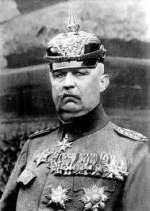
1865 Birth: Erich Ludendorff: German Army officer, noted as a general during World War I, and a co-defendant charged with treason, along with Adolf Hitler, for his part in the Beer Hall Putsch
Ludendorff's political philosophy and outlook on the war effectively influenced Hitler, who largely admired Ludendorff. As a right-wing politician he took part in Hitler's failed Beer Hall Putsch (1923). In 1924 he was elected to the Reichstag as a representative of the Nazi party, serving until 1928. He lost the 1925 presidential election against his former commander, Paul von Hindenburg. Before the Nazi rise to power, the Weimar Republic planned to send him and several other noted German generals (von Mackensen, et al) to reform the National Revolutionary Army of China, but this was cancelled due to the limitations of the Treaty of Versailles and the image problems with selling such a noted general out as a mercenary. After 1928, Ludendorff went into retirement, having fallen out with the Nazi party. He concluded that the world's problems were the result of Christians, Jews and Freemasons. Together with his second wife Mathilde, he founded the "Bund fuer Gotteserkenntnis" (Society for the Knowledge of God), a small and rather obscure esoterical society that has survived until today. In his later years, many believed Ludendorff to be little more than an eccentric. [For further details, Click here.]
1916 World War I: Various:
Gefreiter Adolf Hitler endures trench warfare in Flanders (Artois) with 3 Company, 16 Reserve Infantry Regiment [List Regiment]. [For further details, Click here.]
Battle of Verdun: The third German offensive at Verdun strikes both sides of the salient. The battle was fought between the German and French armies between February 21 and 19 December 1916 around Verdun-sur-Meuse in northeast France. It resulted in more than a quarter of a million deaths and about half a million wounded. It was the longest battle of World War I, and the second bloodiest after the Battle of the Somme (1916).
1917 World War I: Various:
Nivelle Offensive: The long-awaited Allied offensive begins when British troops, following a heavy bombardment and gas attack, assault the German Sixth Army positions near Arras and Canadian troops assault Vimy Ridge. For the Canadian War Office view on Vimy Ridge click here. British War Reporter Philip Gibbs on the Battle of Vimy Ridge:
Today, at dawn, our armies began a great battle, which, if Fate has any kindness for the world, may be the beginning of the last great battles of the war. Our troops attacked on a wide front between Lens and St. Quentin, including the Vimy Ridge, that great, grim hill which dominates the plain of Douai and the coalfields of Lens and the German positions around Arras. In spite of bad fortune in weather at the beginning of the day, so bad that there was no visibility for the airmen, and our men had to struggle forward in a heavy rainstorm, the first attacks have been successful.
List Regiment: Gefreiter Adolf Hitler's 16 Reserve Infantry Regiment, 3 Company, fortify trenches near Arras. [For further details, Click here.]
Russia: widespread popular opposition to the war causes the Petrograd Soviet to repudiate annexationist ambitions.
1917 Birth: Johannes Bobrowski, German lyricist, narrative writer, adaptor and essayist:
As a member of the Confessional Church, Bobrowski had contact to the Christian resistance against National Socialism. He was a lance corporal for the entire Second World War in Poland, France and the Soviet Union. In 1943 he married Johanna Buddrus. From 1945-1949 Bobrowski was imprisoned by the Soviet Union, where he spent time working in a coal mine.
1918 World War I: Various:
Battle of Lys: German troops again strike the British sector, this time in Flanders, threatening the important rail junction of Hazebrouck and the Channel ports. The British are forced to withdraw from Ypres to Armentieres. Paul von Hindenburg on the Opening of the Lys Offensive:
In winter the low-lying area of the Lys river-valley was to a large extent flooded, and in spring it was often nothing but a marsh for weeks on end - a real horror for the troops holding the trenches at this point. North of the Lys the ground gradually rose, and then mounted sharply to the great group of hills which had its mighty pillars at Kemmel and Cassel. It was perfectly hopeless to think of carrying out such an attack before the valley of the Lys was to some extent passable. In normal circumstances of weather, we could only expect the ground to become dry enough by the middle of April. But we thought we could not wait until then to begin the decisive conflict in the West. We had to keep the prospects of American intervention steadily before our eyes. Notwithstanding these objections to the attack, we had the scheme worked out, at any rate in theory.
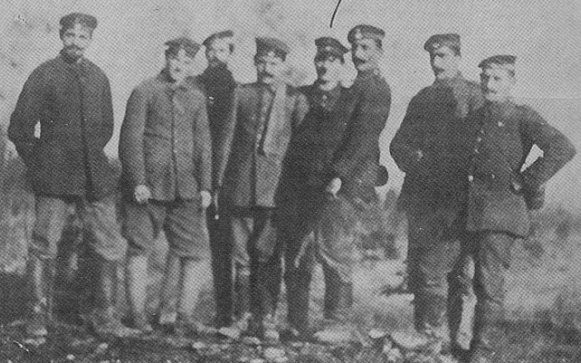
Gefreiter Adolf Hitler's 16th RIR constructs fortified works in difficult defensive positions on an active front with German assault regiments near Fountaine (Montdidier). Above: Hitler and his fellow dispatch runners, [For further details, Click here.]
Latvia proclaims its independence from Russia.
1933 Church and Reich: Various:
Hermann Goering speaks to the NSBO, the Nazi labor organization:

We have slowly begun to create unity from the chaos of parties. Today, these old parties play only a comic role. Today, when one says something political about certain parties, a speaker can hardly do it. As soon as he names certain parties, laughter breaks out in the meeting, since people no longer take them seriously. Who today knows anything about all these ridiculous parties and party splinter groups? Everyone laughs at these leftovers from former times, rather as one looks at antediluvian animals. One shakes one's head that such things ever existed in the German Reich. Only after Adolf Hitler had established the first foundations of domestic unity could we begin to think about strengthening the Reich internationally. For centuries, it had been only a hope, a dream, in Germany: He reestablished the unity of the Reich with a single law from the ruler of the Reich. [For the full text, Click here.]
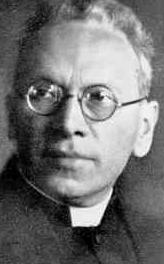
Kaas and Franz von Papen arrive in Rome. Kaas is the first to be received by Secretary of State Pacelli. (THP)
1934 Austria bans dissemination of Pan-German Association propaganda.
[See: Austria: The Other Germany.]1937 The Kamikaze (Mitsubishi Ki-15) [not having the later suicide connotation but] the first Japanese-built aircraft to fly to Europe, arrives at Croydon Airport in London. The flight from Tokyo to London took 51 hours, 17 minutes and 23 seconds and was piloted by Masaaki Iinuma, with Kenji Tsukagoshi serving as navigator. The arrival of the Kamikaze caused a sensation in the Western world. Several years earlier, a prize had been offered for the first flight between Paris and Tokyo within less than 100 hours. Many European aviators had failed at this challenge, and one year before the flight of the Kamikaze, a French pilot attempting the challenge was killed when his aircraft crashed into a mountain on Kyushu. Racism was still very prevalent in the West in 1937, and the Japanese achievement thus stunned many observers who believed that the Japanese people did not have adequate vision for the purposes of flying aircraft. Some observers even speculated that Masaaki Iinuma could not be genuinely Japanese, but was of mixed, partially Mediterranean descent.
1940 World War II: Germany invades Norway and Denmark:
Operation Weseruebung was the code name for Nazi Germany's assault on Denmark and Norway during the Second World War and the opening operation of the Norwegian Campaign. The name comes from the German for Operation Weser-Exercise (Unternehmen Weseruebung), the Weser being a German river. In the early morning of 9 April 1940—Wesertag ("Weser Day")—Germany invaded Denmark and Norway, ostensibly as a preventive manoeuvre against a planned, and openly discussed, Franco-British occupation of both these countries. After the invasions, envoys of the Germans informed the governments of Denmark and Norway that the Wehrmacht had come to protect the countries' neutrality against Franco-British aggression.
From the German Ambassador in the Soviet Union (Schulenburg) to the German Foreign Office:
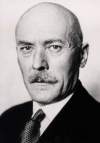
For the Reich Foreign Minister in person. Instruction carried out with Molotov today at 10:30 a. m., European time. Molotov declared that the Soviet Government understood the measures which were forced upon Germany. The English had certainly gone much too far; they had disregarded completely the rights of neutral nations. In conclusion, Molotov said literally: "We wish Germany complete success in her defensive measures." [See: Worst Dictator of Modern Times: Hitler or Stalin?]
1941 World War II: Yugoslavia: Armies are crushed by German Blitzkrieg. German troops enter Salonika. In a speech, Winston Churchill justifies the necessity of answering Greece's appeal for help, calls to America for increased help, saying that main battle is that of the Atlantic.
1942 World War II: Battle of Bataan: American and Philippine defenders on Bataan capitulate to Japanese forces. The surrender is followed by the notorious Bataan Death March, which will claim nearly 10,000 lives. Japanese Navy launches air raid on Trincomalee in Ceylon (Sri Lanka); Royal Navy aircraft carrier HMS Hermes and Royal Australian Navy Destroyer HMAS Vampire are sunk off the country's East Coast.
1944 World War II: Various:
Death: Evgeniya Rudneva: Russian World War II heroine. She flew 645 night combat missions on the old and slow Polikarpov Po-2 biplane, destroying river crossings, troop trains, troops and military equipment of the enemy. She perished valiantly while flying her 645th combat mission near the village of Bulganak, to the north of Kerch. She was shot down by Flak along with her pilot Panna Prokofyeva. In her letter to professor Sergei N. Blazhko, head of the Astrometry Department of Moscow State University, dated October 19, 1942, she wrote that her first bomb she promised the Nazis for the building of the Faculty of mechanics and mathematics, which was bombed by them in the winter. She wrote that she was defending the honor of the university.
Joseph Goebbels discusses Germany's difficult situation:

Many of us will have asked ourselves more frequently over the five years that this war has gone on why it is so especially difficult for the German people to build its national life and its future, why it must make such sacrifices and take on such burdens, things that other, happier peoples are spared, or even know absolutely nothing about. These questions are more than justified. Not only must we fight for our existence with all we have in this war, our whole history is nothing but a path of enormous sorrow. Other peoples reached great or world power status much more easily than we did, and today they have such substantial resources that the length of the war hardly seems to have a material effect on them. We to the contrary must work and slave by the sweat of our brow, and our enemies object to the little that we can call our own. Is not fate treating us unjustly, and do we not have cause to complain? In no way ...
1945 World War II: Various:

Nordhausen and Dora-Mittelbau: (Dora-Nordhausen), where thousands of slave laborers have already died in the underground V-2 plants, is liberated by the Americans.
[See: Wunderwaffen: Hitler's Deception and the History of Rocketry.]

Resistance: Admiral Wilhelm Canaris, former head of the Abwehr, Hans Oster (above, right), and Pastor Dietrich Bonhoeffer are hanged at Flossenbuerg concentration camp. Note: Dohnanyi is killed at the Sachsenhausen Camp, one of four members of Bonhoeffer's immediate family to die at the hands of the Nazi regime for their participation in the small Protestant resistance movement: Two sons (Dietrich and Klaus) and two sons-in-law (Hans von Dohnanyi and Raediger Schleicher).

Mauthausen: The Germans begin evacuating Mauthausen concentration camp.
Battle of Koenigsberg—in East Prussia—ends.
Battle of Berlin: The Red Army is repulsed at the Seelow Heights on the outskirts of Berlin.

War at Sea: The German pocket battleship Admiral Scheer is sunk.
Churchill—according to the minutes of a meeting of the British War Cabinet—"said that he hoped the day of the celebrations would be known as VE-day." (Meacham)
1946 Nuremberg Tribunal:
On day 103, Major F. Elwyn Jones (Junior Counsel for the United Kingdom), cross-examines Dr Hans Heinrich Lammers, who has been called to the stand by Keitel's defense:
Major Jones: As Reich Chancellor you were responsible for distributing the largess of the Nazis among yourselves, were you not?
Lammers: I was in charge of the Fuehrer's funds; and on his instructions I made the necessary payments out of those funds. I could not spend money as I pleased.
Major Jones: You, as Reich Chancellor, delivered a million Reichsmark to Dr. Ley, did you not?
Lammers: That was a donation that the Fuehrer specifically granted to Ley. I did not do that on my own initiative.
Major Jones: And Ribbentrop was another recipient of a million, was he not?
Lammers: He received a million in installments, first one half and then the other.
Major Jones: And Keitel was another millionaire, was he not? He received a million, did he not?
Lammers: He received a sum of money and an estate, because the Fuehrer renewed the practice of the old Prussian kings of granting land and money to his generals.
Major Jones: And you yourself received 600,000 marks, did you not?
Lammers: I received 600,000 marks on my 65th birthday. I received this sum because I had never received anything in my previous positions, since I had never asked for it—also because I had twice been bombed out and had no house or property of my own. The Fuehrer wished me to buy a small house.
Major Jones: That is all.
1950 Spandau Prison: From Spandau: The Secret Diaries, by Albert Speer:
For several weeks [Rudolf] Hess has been refusing to get up in the mornings, to wash, to go for breakfast. He says he is in such pain that he cannot stand it. Several times there have been noisy scenes with the guards in his cell. In response to the shouts of "Get up! Out of bed, out!" Hess could be heard whimpering: "Pain! I can't. I can't go on. Don't you see how I'm suffering? It's terrible!" Now the American doctor has given orders that Hess must get up for an hour in the morning, wash and clean his cell, but that he may lie down again. I am no longer allowed to bring him his food. Obviously the doctor thinks Hess is malingering. An x-ray has shown nothing significant. (Speer II)
1954 Spandau Prison: From Spandau: The Secret Diaries, by Albert Speer:
[Erich] Raeder and [Walter] Funk are also ill. I wouldn't mind being without them . . . . Funk remarks dully, in a low voice, "It's too late for me. Nothing matters to me anymore." The poor fellow is painfully struggling to win the favor of the Russian guards. He addresses them with friendly smiles, but they do not react. (Speer II)
1959 Wunderwaffen: NASA selects the USA's first astronauts, "the Mercury Seven."
1963 Winston Churchill is made an honorary US citizen. Churchill's response to the Kennedy Administration:

I have received many kindnesses from the United States of America, but the honour which you now accord me is without parallel. I accept it with deep gratitude and affection. I am also most sensible of the warm-hearted action of the individual States who accorded me the great compliment of their own honorary citizenships as a prelude to this Act of Congress. It is a remarkable comment on our affairs that the former Prime Minister of a great sovereign state should thus be received as an honorary citizen of another. I say "great sovereign state" with design and emphasis, for I reject the view that Britain and the Commonwealth should now be relegated to a tame and minor role in the world. Our past is the key to our future, which I firmly trust and believe will be no less fertile and glorious. Let no man underrate our energies, our potentialities and our abiding power for good. I am, as you know, half American by blood. [For further details, and the full text of Churchill's statement, Click here.]
1966 A statue of Winston Churchill is dedicated at the British Embassy in Washington DC.
Edited by Levi Bookin (Copy editor)
levi.bookin@gmail.com



Click to join 3rdReichStudies

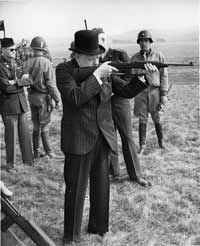
Please note that the list-owner and the moderator are not responsible for, and do not necessarily approve of, the random ads placed on our pages by our web server. They are the unfortunate price one pays for a 'free' website.
FAIR USE NOTICE: This site may contain copyrighted material the use of which has not always been specifically authorized by the copyright owner. We are making such material available in our efforts to advance understanding of historical, political, human rights, economic, democracy, scientific, environmental, and social justice issues, etc. We believe this constitutes a 'fair use' of any such copyrighted material as provided for in section 107 of the US Copyright Law. In accordance with Title 17 U.S.C. Section 107, the material on this site is distributed without profit to those who have expressed a prior interest in receiving the included information for research and educational purposes. If you wish to use copyrighted material from this site for purposes of your own that go beyond 'fair use', you must obtain permission from the copyright owner.